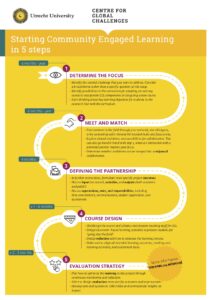Toolbox Community Engaged Learning
Community Engaged Learning is experiential education in which students, teachers and external partners work together on societal challenges. Community Engaged Learning integrates societal engagement with academic study and reflection to enrich and enhance the learning experience and contribute to community needs. Utrecht University wants to contribute to solving social issues. That is why UU stimulates CEL: in CEL education, students use academic knowledge and skills in order to make a contribution to the solving of social issues together with external partners. This lets them not only learn about the complexity of social issues, but also about the value of academic knowledge.

The Centre for Global Challenges has developed a toolkit, in collaboration with the programme Community Engaged Learning and the Centre for Academic Teaching and Learning. It covers an explanation of what Community Engaged Learning is (for the UU) and good practices, 5 steps to integrate CEL in your teaching, how to develop and maintain relationships with societal partners and how to stimulate students to reflect. You can download the full CEL Toolbox here or the separate pdf’s per subject.
CEL at the UU
Community Engaged Learning at Utrecht University has the following characteristics:
- The focus is on (local and/or global) societal challenges in which scientific knowledge and skills can make a difference
- We work on questions and needs of society
- Students, scientists and external stakeholders investigate the societal challenge together and thereby all learn (reciprocity)
- The course is embedded in the curriculum
- It is experiential education: a form of education in which students learn by doing and experiencing by truly being active in society
- Scientific and societal reflection is the foundation for learning by all participants
More information
- Community Engaged learning at UU [Intranet, login with SolisID]
- News item on Toolkit launch [Intranet, login with SolisID]
